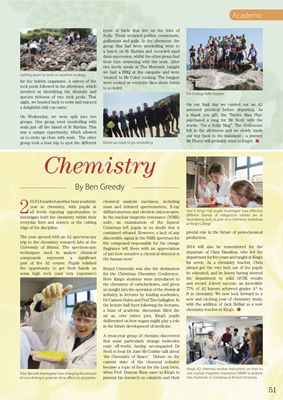
2013/14 marked another busy academic
year in chemistry, with pupils at
all levels enjoying opportunities to
investigate both the chemistry within their
everyday lives and science at the cutting
edge of the discipline.
The year opened with an A2 spectroscopy
trip to the chemistry research labs at the
University of Bristol. The spectroscopic
techniques used to analyse chemical
compounds represent a significant
part of the A2 course. Pupils relished
the opportunity to get their hands on
some high tech (and very expensive) chemical analysis machines, including
mass and infrared spectrometers, X-ray
diffractometers and electron microscopes.
In the nuclear magnetic resonance (NMR)
suite, an examination of the liqueur
Cointreau left pupils in no doubt that it
contained ethanol. However, a lack of any
discernible signal in the NMR spectrum for
the compound responsible for the orange
fragrance left them with an appreciation
of just how sensitive a chemical detector is
the human nose!
Bristol University was also the destination
for the Christmas Chemistry Conference.
Here King's students were introduced to
the chemistry of carbohydrates, and given
an insight into the operation of the chemical
industry in lectures by leading academics,
Dr Carmen Galen and Prof Tim Gallagher. In
the lecture hall foyer following the lectures,
a buzz of academic discussion filled the
air as, over mince pies, King's pupils
deliberated on how sugars might play a role
in the future development of medicine.
A cross-year group of chemists discovered
that some particularly strange molecules
exist off-world, having accompanied Dr
Snell to hear Dr June McCombie talk about
'the Chemistry of Space.' Debate on the
current state of the chemical industry
became a topic of focus for the Lent term,
when Prof. Duncan Wass came to King's to
present his research on catalysts and their
pivotal role in the future of petrochemical
production.
2014 will also be remembered for the
departure of Chris Hamilton, who led the
department for five years and taught at King's
for seven. As a chemistry teacher, Chris
always got the very best out of the pupils
he educated, and he leaves having steered
the department to solid GCSE results
and record A-level success: an incredible
77% of A2 leavers achieved grades A* to
B in chemistry. We now look forward to a
new and exciting year of chemistry study,
with the addition of Jack Helliar as a new
chemistry teacher at King's.
Chemistry
By Ben Greedy
for the hidden organisms. A survey of the
rock pools followed in the afternoon, which
involved us identifying the diversity and
species richness of two rock pools. That
night, we headed back to town and enjoyed
a delightful chili con carne.
On Wednesday, we were split into two
groups. One group went snorkelling with
seals just off the island of St Martins. This
was a unique opportunity, which allowed
us to swim up close with seals. The other
group took a boat trip to spot the different
types of birds that live on the Isles of
Scilly. These included puffins, cormorants,
guillemots and gulls. In the afternoon, the
group that had been snorkelling went to
a beach on St Martins and recorded sand
dune succession, whilst the other group had
their turn swimming with the seals. After
two lovely meals at The Mermaid, tonight
we had a BBQ at the campsite and were
'treated' to Mr Coles' cooking. The burgers
were cooked as everyone likes them: burnt
to a cinder.
On our final day we carried out an A2
assessed practical before departing. As
a thank you gift, the 'Twelve Man Plan'
purchased a mug for Mr Scott with the
words: "I'm a Scilly Mug". The Scillonian
left in the afternoon and we slowly made
our way back to the mainland - a journey
Mr Florey will probably want to forget.
Getting down to work on seashore ecology
The biology ield-trippers
Kitted up ready to go snorkelling
Toby Bennett investigates how changing the amount
of cross-linking in polymer slime afects its properties
King's A2 chemists receive instruction on how to
use nuclear magnetic resonance (NMR) to analyse
the chemicals in Cointreau at Bristol University
Year 6 King's Hall pupils investigate how efective
diferent brands of indigestion tablets are at
neutralising acid, as part of a chemistry workshop
at King's College
Academic 51